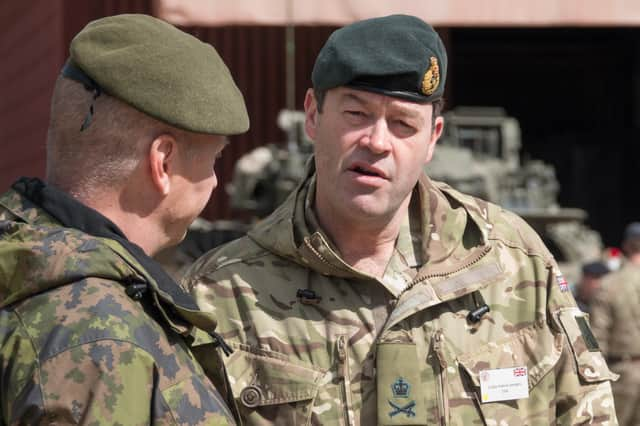British men and women warned by army chief they may be called to war if Nato enters into conflict with Russia


British people are been warned that they may be called to war if the UK enters in to any conflicts because the army does not have enough members.
The warning comes ahead of a speech from the head of the army, General Sir Patrick Sanders, later today (Wednesday January 24). He is expected to emphasise the need for the Government to “mobilise the nation” in the event of war with Russia.
Advertisement
Hide AdAdvertisement
Hide AdGen Sir Patrick, who has criticised the cuts army numbers, is reported to have said that British men and women should be prepared for a call-up to service if Nato goes to war with Vladimir Putin.
His supposed claims comes after a senior Nato military official warned that the public should prepare for an all-out war with Russia within the next 20 years - and said that it would mean a change in their lives. Adml Rob Bauer said that nations needed to be prepared to “find more people if it comes to war”, and to consider “mobilisation, reservists or conscription”.
This is not the first time that Gen Sir Patrick has hinted that members of the public may be needed to support the army. In 2022, he predicted that the UK was facing its “1937 moment” over the war in Ukraine, and said Britain must be ready to “fight and win” to ward off the threat from Russia.
He is not believed to support the idea of compulsory enrollment of people in to military service, but is said to think that there should be a “shift” in the mindset of ordinary British people so that they think more like troops and are mentally prepared for going to war with Russia.
Advertisement
Hide AdAdvertisement
Hide AdGen Sir Patrick, who will stand down as Chief of the General Staff in six months, will make his speech at the International Armoured Vehicles conference in Twickenham. Annually attracting 1000 delegates from over 40 nations, conference attendance spans personnel from all military backgrounds.
As of 1 October 2023, the British Army comprised 75,983 regular full-time personnel, 4,097 Gurkhas, 26,546 volunteer reserve personnel and 4,548 "other personnel", for a total of 111,174, according to government data.
If Brits were asked to sign up to fight in a war, it would be the first time in decades - and almost 60 years since conscription was last used. Mandatory military service was introduced during the First World War (1914 to 1918) after the government passed the Military Service Act in 1916.
The National Service (Armed Forces) Act was introduced on September 1 1939, the day Britain declared war on Germany at the outbreak of the Second World War (1939 to 1945). The Act meant that all men aged between 18 and 41, unless those were exempt, had to sign up and fight. Exemptions included those who were medically unfit as well as the blind, disabled, and those with mental health issues.
Advertisement
Hide AdAdvertisement
Hide AdFollowing the end of the Second World War, a new National Service Act was passed that required all young men aged 17 to 21 to serve in the armed forces for 18 months and to remain on the reserve list for several years. In November 1960 the last conscripted men entered service, as call-ups formally ended on December 31 1960. National Service, however, continued until the last servicemen were demobolised in 1963.
The concept of conscription is more recently detailed in the Civil Contingencies Act 2004, where Section 23(3) deems that "emergency regulations may not require a person, or enable a person to be required, to provide military service". This means that any call ups required for future wars are likely to be on a voluntary basis, rather than compulsory.
But the prime minister's official spokesman has poured cold water on the likelihood of conscription, saying: "The government has no intention to follow through with that [conscription]. The British Army has a proud tradition of being a voluntary force, it has no plans to change that."
Comment Guidelines
National World encourages reader discussion on our stories. User feedback, insights and back-and-forth exchanges add a rich layer of context to reporting. Please review our Community Guidelines before commenting.
